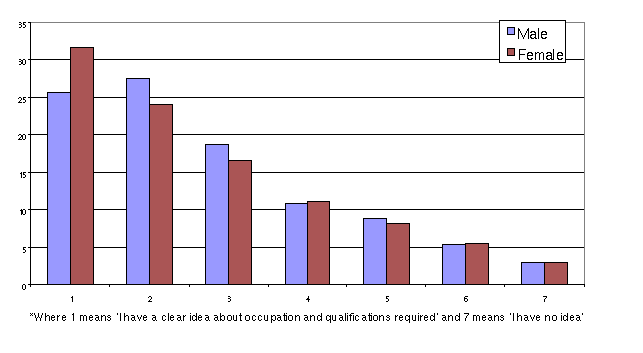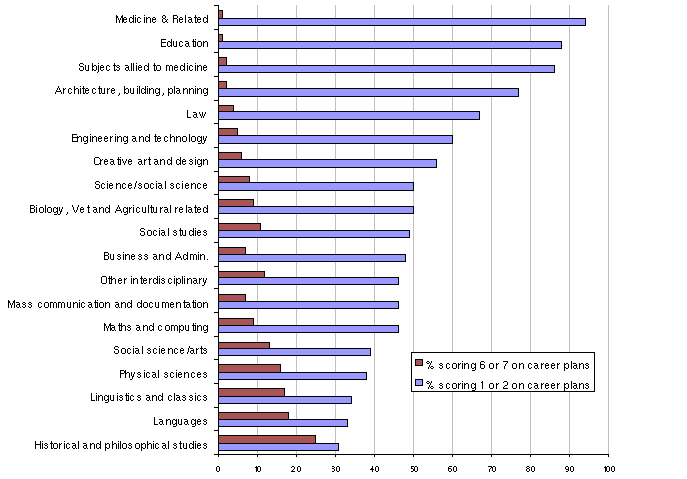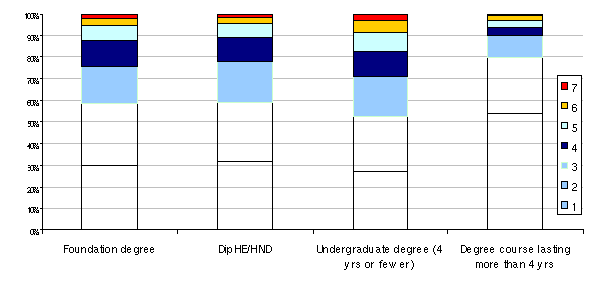Research Shows Todays Students Sharply Focused on Future Career
Research by the University of Warwick’s Institute for Employment Research is finding that students setting out on university courses have acute awareness of the rigours of the job market and the investment made in their education which makes them very sharply focused on their future careers.
The University of Warwick Institute for Employment Research researchers, Professor Kate Purcell and Professor Peter Elias, were commissioned by the Higher Education Careers Services Unit to survey all students who applied to enter HE in Autumn 2006 – the biggest study of its kind ever carried out - and 129,000 responded to this new Futuretrack study.
As well as being asked about their decisions about what and where to study and their views about the value of a degree, students were asked to respond on a scale of 1-7 where 1 means ‘I have a clear idea about the occupation I hope to enter and the qualifications required for it’ and 7 means ‘I have no idea what I will do when I complete my course’. They found that over half the students surveyed put themselves in categories 1 or 2, suggesting that they were very focussed on what they were doing and why.
Unsurprisingly the researchers found that vocational subjects such as Medicine and Education had the largest cohorts of the most career focussed students but even subjects traditionally considered as much less vocational had relatively high percentages (for instance over 30% put themselves in categories 1 or 2 for History and philosophical subjects).
Professor Kate Purcell from the University of Warwick’s Institute for Employment Research said:
“In comparison to previous research findings, the data indicates increased awareness of HE and the labour force as markets within which participants must compete, and where education is seen as an investment by students and their families who have increasingly been required to contribute to its cost.”
Unsurprisingly there was also a clear an association between the type of course applied for and the degree to which applicants had clear vocational perspectives – with just under 80 per cent of those embarking on courses lasting more than four years scoring themselves as 1 or 2, and those doing Foundation degrees or HNDs next most likely to do so with just under 60 per cent respectively.
Tables follow:
Figure 2.1: Clarity of ideas about career prior to course*
Broad subject by extent to which applicants had clear occupationally-focused career plans
* where 1 = ‘I have a clear idea of the occupation I eventually want to enter and the qualifications required to do so’ and 7= ‘I have no idea what I will do after I complete the course I have applied for’< /font>
Figure 2.2: Clarity of ideas about career prior to course* by type of course applied for
NB this last table may not translate well to web and colour markings for catergory one and two may not appear but the dividing line between them should still be clear.
* Where 1 means ‘I have a clear idea about occupations and qualifications required’ and 7 means ‘I have no idea’
Note for Editors: Futuretrack is a major longitudinal study of all applicants to full-time UK HE courses who applied through the Universities and Colleges Admissions Service (UCAS). The survey will ‘revisit’ the 2006 applicant cohort students ‘one year on; in their final year, and two years post graduation. This research is being undertaken by an interdisciplinary research team at the Institute for Employment Research at The University of Warwick led by Professor Kate Purcell, on behalf of HECSU and in conjunction with UCAS. These results are based on a participating sample of 129,020 applicants
For further information please contact:
Professor Kate Purcell
Warwick Institute for Employment Research
University of Warwick
Coventry CV4 7AL
Tel: 024 76523288
Mobile: 07824 540837
email: kate.purcell@warwick.ac.uk
Peter Dunn, Communications Office, University of Warwick
Tel 024 76 523708or 07767 655860
email: p.j.dunn@warwick.ac.uk
PR56 PJD 19th June 2007



